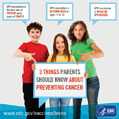Online Resources
On This Page
Use CDC’s online resources to share easy-to-read information about preteen and teen vaccines and the diseases they prevent. Find links to articles (feature stories) for parents, electronic greeting cards for family, friends, or patients, and a button for your website or blog.
Infographics
Three Things Parents Should Know about Preventing Cancer
Here are three things all parents should know about preventing cancers caused by HPV infections…
Web Features
You can integrate CDC content, such as these feature articles about preteen and teen vaccines, on your website using CDC’s free content syndication service. If you’d like to include this Web content without having to monitor and copy updates, visit Content Syndication.
Preteens Need Vaccines Too!
English | En español
Do you have a preteen or teen? Protect them from serious diseases by making sure they have received the vaccines recommended for preteens and teens.
Minority Health and HPV
English | En español
Make a difference in your community by reducing the risk of HPV-related cancers. Get your child vaccinated.
Protect Your Daughter from Cervical Cancer
English | En español
Every year in the U.S., about 4,000 women die from cervical cancer—even with screening and treatment. In addition, about 17,600 women are affected by HPV-related cancers yearly. Most of these cancers could be prevented by HPV vaccine.
HPV Vaccine is Recommended for Boys
English
A lot of parents know that HPV vaccine protects girls against cervical cancer. But did you know that vaccinating boys can protect them against cancer, too?
Put “HPV Cancer Prevention” on Your Back-to-School Checklist
English | En español
HPV vaccine can prevent certain cancers and other diseases caused by human papillomavirus (HPV). Get your girls and your boys vaccinated at 11 or 12, or as soon as possible if they’re already 13 or older.
Meningococcal Disease: Help Prevent It
English | En español
Meningitis and meningococcal disease are serious, vaccine-preventable infections. The meningococcal conjugate vaccine is recommended for all 11-18 year olds. Kids should get this vaccine at their 11-12 years of age and a booster dose at age 16.
Tetanus: Make Sure You and Your Child Are Fully Immunized
English | En español
Playing outdoors can mean getting cuts that may become infected with bacteria commonly found in soil, including the ones that cause tetanus. Tetanus vaccine can help prevent tetanus disease, commonly known as “lockjaw.”
- Page last reviewed: May 11, 2016
- Page last updated: August 2, 2017
- Content source:


 ShareCompartir
ShareCompartir







